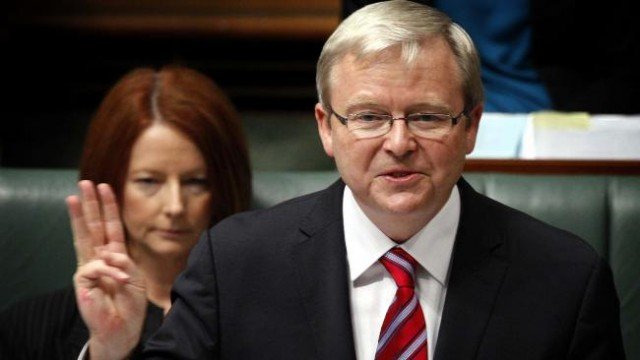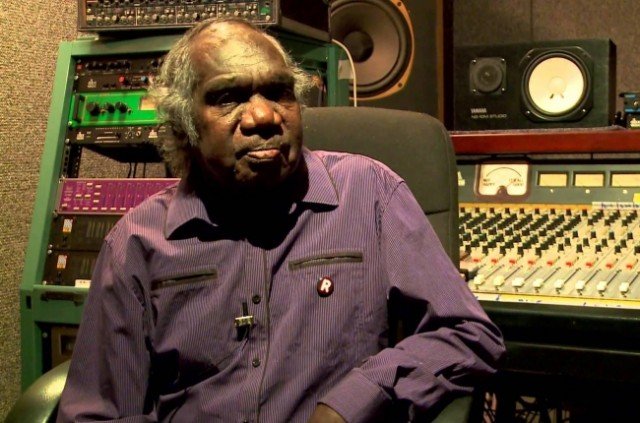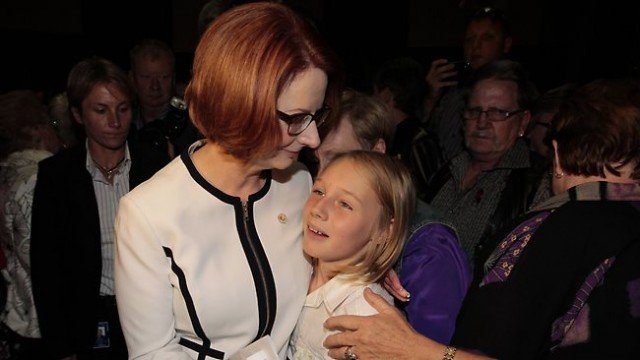Home Tags Posts tagged with "julia gillard"
julia gillard
Australia’s PM Julia Gillard has been ousted by Kevin Rudd as leader of Labor Party.
Kevin Rudd won by 57 votes to 45, in a leadership ballot of Labor lawmakers.
The change comes ahead of a general election due in September, which polls suggest Labor is set to lose.
This is the latest twist in a long and bitter rivalry between Julia Gillard and Kevin Rudd – but it could be the last as the prime minister has said she will now leave politics.
“I will not re-contest the federal electorate… at the forthcoming election,” said Julia Gillard, Australia’s first female prime minister.
“What I am absolutely confident of is it will be easier for the next woman and the woman after that and the woman after that, and I’m proud of that,” she added.
Despite their bitter rivalry, Kevin Rudd praised his predecessor, describing her as a woman of extraordinary intelligence, with great strength and energy.
“Julia, as prime minister and prior to that as deputy prime minister, has achieved much under the difficult circumstances of a minority government,” Kevin Rudd told a news conference after his victory.

Australia’s PM Julia Gillard has been ousted by Kevin Rudd as leader of Labor Party
Kevin Rudd is more popular with voters than Julia Gillard, and many believe Labor will perform better in the election under him.
Wednesday’s leadership test was the third faced by Julia Gillard since she took office in 2010. She herself ousted Kevin Rudd as prime minister in 2010.
Kevin Rudd has exacted his revenge, after three years of him and his supporters mounting a destabilization campaign targeted very much at her.
The ballot followed months of speculation over the party’s leadership, and came after a day of drama that saw Kevin Rudd’s supporters push for a vote.
Shortly before the vote, a key power-broker, Bill Shorten, switched his support to Kevin Rudd, saying Labor stood a better chance in the polls with him.
Many people do not think Kevin Rudd will win the election but he may mitigate the losses and shorten the time Labor could spend in opposition if the party loses.
A poll published earlier this month suggested that three cabinet ministers would lose their seats at the poll under Julia Gillard’s leadership, but would retain their seats if Kevin Rudd was leading the party.
The vote makes Kevin Rudd the leader of the Labor Party, but not prime minister.
Julia Gillard must write to Governor General Quentin Bryce stating that she is resigning as prime minister before Kevin Rudd can be sworn in.
A shake-up in the cabinet is expected following the leadership change.
Deputy PM Wayne Swan has already quit because of Kevin Rudd’s victory. He has been replaced by Kevin Rudd ally and transport minister Anthony Albanese.
[youtube En9XHTq3Jw8]
[youtube pos_Bw3hSjY]
Singer Yunupingu, one of Australia’s leading indigenous figures, has died aged 56 at his home in Yirrkala in Eastern Arnhem Land.
Mandawuy Yunupingu, lead singer of Yothu Yindi, died at his home in the Northern Territory after suffering from kidney disease.
He was a significant cultural figure whose music helped bridge the divide between white and black Australians.
Yunupingu is also widely credited with introducing indigenous music to the world with the 1990s hit Treaty.
The song, which blends indigenous music and rock, made him a household name.

Mandawuy Yunupingu, lead singer of Yothu Yindi, died at his home in the Northern Territory after suffering from kidney disease
It also helped win him the Australian of the Year award in 1992, for “building bridges of understanding between Aboriginal and non-Aboriginal people”.
“We have lost a uniquely talented musician, a passionate advocate for Aboriginal people and a truly great friend,” Australian Prime Minister Julia Gillard said.
Before entering the music industry, Yunupingu was a teacher.
He was the first Aboriginal person from Arnhem Land to gain a university degree and also Australia’s first indigenous school principal, taking over as head of the Yirrkala Community School in 1990.
Yothu Yindi toured internationally and released a successful album in 1992, Tribal Voice.
Former Midnight Oil singer Peter Garret, who is now an Australian government minister, described him as a “path breaker and leader. A shining light for his people.”
[youtube q8m4zhxo0ME]
Australian PM Julia Gillard has issued an apology to people affected by the country’s forced adoption policy between the 1950s and 1970s.
Tens of thousands of babies of unmarried, mostly teenage mothers, were thought to have been taken by the state and given to childless married couples.
Many women said they were coerced into signing away their children.
Speaking in front of hundreds of the victims, PM Julia Gillard said the “shameful” policy had created “a legacy of pain”.
“Today, this Parliament, on behalf of the Australian people, takes responsibility and apologizes for the policies and practices that forced the separation of mothers from their babies which created a lifelong legacy of pain and suffering,” Julia Gillard said at Parliament House in the capital Canberra.
“We deplore the shameful practices that denied you, the mothers, your fundamental rights and responsibilities to love and care for your children.”
Julia Gillard said mothers had been denied knowledge of their rights, which meant they could not provide informed consent.
“You were given false assurances, you were forced to endure the coercion and brutality of practices that were unethical, dishonest and in many cases illegal,” the prime minister said.

Australian PM Julia Gillard has issued an apology to people affected by the country’s forced adoption policy between the 1950s and 1970s
Many people in the crowd broke down in tears during her speech, which was greeted with applause.
Julia Gillard also announced the Australian government would provide A$5 million funding to improve access to specialist support, records tracing and mental health care for those affected by forced adoption.
Last February, a Senate committee called for the national apology after investigating the impact of the policy.
The report was based on submissions from hundreds of women.
Many said they gave up their children because of stigma attached to unmarried motherhood at the time.
Some said they were drugged, while others said their signatures were forged.
[youtube _vpmrxRxwFY]
Australia’s Prime Minister Julia Gillard has outlined Asia manifesto, a major foreign policy plan aimed at improving Asian ties.
The government white paper sets out 25 national objectives to be met by 2025, with targets ranging from improving trade links to teaching more Mandarin.
Julia Gillard said she wanted to refocus Australia away from Europe’s “old countries” towards its near neighbors – particularly China and India.
The plan is detailed in a 312-page paper, Australia in the Asian Century.
With Asia on track to become home to most of the world’s middle class in the next 20 years, this was a moment in history to grasp, said Julia Gillard during the release of the white paper at Sydney’s Lowy Institute.
“The scale and pace of Asia’s rise is staggering, and there are significant opportunities and challenges for all Australians,” she said.
“It is not enough to rely on luck – our future will be determined by the choices we make and how we engage with the region we live in.”
While Julia Gillard underlined continued strategic ties with the US, her speech formalized trends built up during the past three decades in which China has become Australia’s top trading partner, ahead of Japan, the US and South Korea.
Previous prime ministers such as Bob Hawke and Paul Keating established the first ties with Asia, but the new policy would be deeper and more organized.
Some of the goals outlined are specific, others more aspirational. They include:
• Boosting Australia’s average national income from $62,000 per person now to $73,000 in 2025
• Improving the school system so it is ranked in the world’s top five, with 10 of its universities in the world’s top 100
• Making studies of Asia a core part of the Australian school curriculum
• Giving all students the opportunity to learn a priority Asian language – Chinese (Mandarin), Hindi, Indonesian or Japanese
• Making sure more business leaders are “Asia-literate”
A member of the 21-member Asia-Pacific Economic Cooperation (APEC) group, Australia is one of the 11 nations involved in negotiations for a Trans-Pacific Partnership (TPP), both of which aim to liberalize regional trade.
On security issues, Australia in the Asian Century says any policy aimed at containing China’s military growth would not work.
Rather, it says Australia can balance its defence ties to the US while backing China’s emerging military strength.
Australian Prime Minister Julia Gillard fell flat on her face when her heel became stuck in the grass in India.
Julia Gillard was on a goodwill visit to India when she took the tumble in what was her third faux pas involving her shoes this year.
She famously lost a blue suede shoe during an Aboriginal demonstration in Canberra in January and just two months ago she slipped out of one of her high heels while walking on stage at a function at Sydney’s Custom House.
Now she’s gone down again, this time following a visit to the Gandhi Memorial in New Delhi on the final day of her three-day state visit to India.
Julia Gillard was being escorted to the Presidential Palace by a group of officials when she suddenly fell forward heavily onto the grass, landing on her hands and knees.
As aides turned to help her up she told them: “I’m fine. My heel got stuck in grass.”

Julia Gillard fell flat on her face when her heel became stuck in the grass
Later she laughed off the incident, explaining that unlike men who wore flat shoes, it was an occupational hazard for women wearing modest heels.
“I’m fine,” she repeated.
“For men who get to wear flat shoes all day every day, if you wear a heel it can get embedded in soft grass and when you pull your foot out the shoe doesn’t come and the rest of it is as you saw.”
When someone suggested that perhaps she could wear boots to prevent similar mishaps she brushed the idea aside.
That, she said, would lead to all kinds of fashion critiques in Australia where she would be faulted for wearing boots with a skirt.
Of the three shoe incidents she has been involved in this year, the tumble in Delhi was the most spectacular.
But as drama goes, the day Julia Gillard was surrounded by angry protesters in Canberra was the most frightening, with minders whisking her away from the shouting.
Behind her she left that blue sued shoe which some demonstrators threatened to sell on eBay – before it was returned to her.
[youtube bpUUt2QpacU]
Australian lower house has approved laws allowing offshore processing camps for asylum seekers to be re-established in Papua New Guinea and Nauru.
The MPs passed a bill presented to parliament on Tuesday, following recommendations from an expert panel.
The bill now goes to the Senate, where it is expected to pass in coming days because both the governing Labor Party and the opposition back it.
Labor, under former Prime Minister Kevin Rudd, closed the camps in 2008.
The debate on the legislation in the lower house lasted for six hours on Tuesday and continued the next day. Only two MPs – an independent and one from the Australian Greens party – voted against the bill.
Immigration Minister Chris Bowen, speaking before the vote, said it was important that the bill pass.
“The Australian people expect no less and the people smugglers fear nothing more,” he said.
Prime Minister Julia Gillard – whose party had until Monday opposed the move – said on Tuesday that she hoped processing centres for asylum seekers could be reopened “within a month”.
The vote followed the release on Monday of a report by an expert panel appointed by Julia Gillard to break the deadlock on the issue of asylum.
It set out 22 recommendations aimed at tackling people-smuggling issues, including re-opening mothballed offshore processing centres.

Australian lower house has approved laws allowing offshore processing camps for asylum seekers to be re-established in Papua New Guinea and Nauru
The move comes amid rising numbers of asylum seekers travelling to Australia by boat from Indonesia.
Officials reported that at least three boats carrying more than 150 people were intercepted on Tuesday.
Australian officials say offshore processing is needed as a deterrent against making the perilous journey – pointing out that many lives have been lost in sinkings in recent years.
But critics say the policy – known as the Pacific Solution before it was scrapped in 2008 – violates asylum seekers’ rights.
In the past detainees on Nauru mounted multiple hunger strikes to protest against both conditions and the length of their detention.
Small protests against offshore processing have been reported outside immigration offices in Sydney and Melbourne.
Melissa Park, a Labor MP, earlier said that the measures being debated were “at the lower end of what we are capable of as a nation”.
“There are strong concerns about the devastating consequences, including severe mental health issues of detention of asylum seekers for indeterminate periods on Nauru and Manus Island,” she said.
The Pacific Solution was introduced in 2001 by the government of John Howard, in response to a reported rise in the number of asylum seekers arriving by boat.
Processing centres were set up on Nauru and on Manus Island in Papua New Guinea, the governments of the two nations receiving millions of dollars in aid in exchange.
The Australian navy diverted all boats carrying asylum seekers to those camps, where many were detained for months – sometimes years – under high security.
Many Australians did support the policy but rights groups condemned it and accused Australia of failing to meet its obligations under refugee conventions.
Australia asylum:
• In 2010, there were 6,535 Irregular Maritime Arrivals (IMAs – people coming by sea) in 134 vessels
• In 2011, 4,565 IMAs arrived in 69 vessels
• As of 13 August 2012, 7,629 IMAs had arrived in 114 boats
• To date, July has been the busiest month, with 1,798 IMAs
• Most of the IMAs from 2009-2011 came from Afghanistan, Sri Lanka and Iran
• Some asylum-seekers arrive by plane. Between July 2010 and June 2011, 6,316 people applied in this way
Source: Australian Department of Immigration and Citizenship
Pacific Solution
• Established in 2001 under conservative government of John Howard
• Asylum seekers arriving by boat detained in offshore centres in PNG and Nauru
• Rights groups criticized the conditions in which people were held, as detainees went on repeated hunger strikes
• Labor’s Kevin Rudd elected in November 2007, said Pacific Solution would end
• Last detainees left Nauru in February 2008





